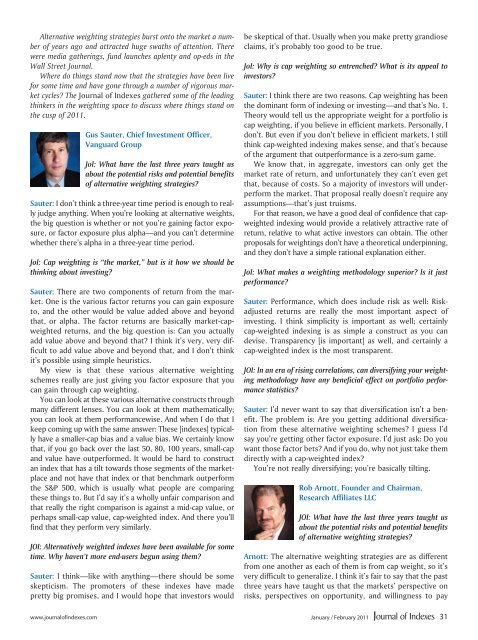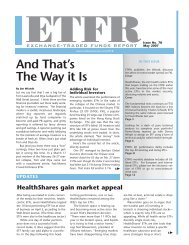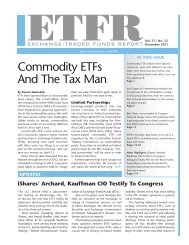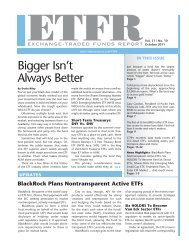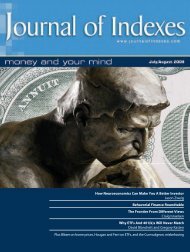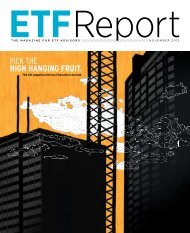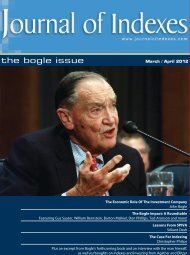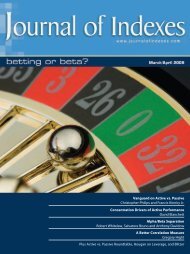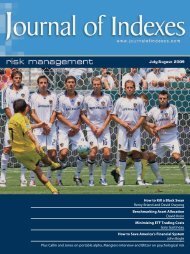Improved Beta? - IndexUniverse.com
Improved Beta? - IndexUniverse.com
Improved Beta? - IndexUniverse.com
You also want an ePaper? Increase the reach of your titles
YUMPU automatically turns print PDFs into web optimized ePapers that Google loves.
Alternative weighting strategies burst onto the market a number<br />
of years ago and attracted huge swaths of attention. There<br />
were media gatherings, fund launches aplenty and op-eds in the<br />
Wall Street Journal.<br />
Where do things stand now that the strategies have been live<br />
for some time and have gone through a number of vigorous market<br />
cycles? The Journal of Indexes gathered some of the leading<br />
thinkers in the weighting space to discuss where things stand on<br />
the cusp of 2011.<br />
Gus Sauter, Chief Investment Officer,<br />
Vanguard Group<br />
JoI: What have the last three years taught us<br />
about the potential risks and potential benefits<br />
of alternative weighting strategies?<br />
Sauter: I don’t think a three-year time period is enough to really<br />
judge anything. When you’re looking at alternative weights,<br />
the big question is whether or not you’re gaining factor exposure,<br />
or factor exposure plus alpha—and you can’t determine<br />
whether there’s alpha in a three-year time period.<br />
JoI: Cap weighting is “the market,” but is it how we should be<br />
thinking about investing?<br />
Sauter: There are two <strong>com</strong>ponents of return from the market.<br />
One is the various factor returns you can gain exposure<br />
to, and the other would be value added above and beyond<br />
that, or alpha. The factor returns are basically market-capweighted<br />
returns, and the big question is: Can you actually<br />
add value above and beyond that? I think it’s very, very difficult<br />
to add value above and beyond that, and I don’t think<br />
it’s possible using simple heuristics.<br />
My view is that these various alternative weighting<br />
schemes really are just giving you factor exposure that you<br />
can gain through cap weighting.<br />
You can look at these various alternative constructs through<br />
many different lenses. You can look at them mathematically;<br />
you can look at them performancewise. And when I do that I<br />
keep <strong>com</strong>ing up with the same answer: These [indexes] typically<br />
have a smaller-cap bias and a value bias. We certainly know<br />
that, if you go back over the last 50, 80, 100 years, small-cap<br />
and value have outperformed. It would be hard to construct<br />
an index that has a tilt towards those segments of the marketplace<br />
and not have that index or that benchmark outperform<br />
the S&P 500, which is usually what people are <strong>com</strong>paring<br />
these things to. But I’d say it’s a wholly unfair <strong>com</strong>parison and<br />
that really the right <strong>com</strong>parison is against a mid-cap value, or<br />
perhaps small-cap value, cap-weighted index. And there you’ll<br />
find that they perform very similarly.<br />
JOI: Alternatively weighted indexes have been available for some<br />
time. Why haven’t more end-users begun using them?<br />
Sauter: I think—like with anything—there should be some<br />
skepticism. The promoters of these indexes have made<br />
pretty big promises, and I would hope that investors would<br />
be skeptical of that. Usually when you make pretty grandiose<br />
claims, it’s probably too good to be true.<br />
JoI: Why is cap weighting so entrenched? What is its appeal to<br />
investors?<br />
Sauter: I think there are two reasons. Cap weighting has been<br />
the dominant form of indexing or investing—and that’s No. 1.<br />
Theory would tell us the appropriate weight for a portfolio is<br />
cap weighting, if you believe in efficient markets. Personally, I<br />
don’t. But even if you don’t believe in efficient markets, I still<br />
think cap-weighted indexing makes sense, and that’s because<br />
of the argument that outperformance is a zero-sum game.<br />
We know that, in aggregate, investors can only get the<br />
market rate of return, and unfortunately they can’t even get<br />
that, because of costs. So a majority of investors will underperform<br />
the market. That proposal really doesn’t require any<br />
assumptions—that’s just truisms.<br />
For that reason, we have a good deal of confidence that capweighted<br />
indexing would provide a relatively attractive rate of<br />
return, relative to what active investors can obtain. The other<br />
proposals for weightings don’t have a theoretical underpinning,<br />
and they don’t have a simple rational explanation either.<br />
JoI: What makes a weighting methodology superior? Is it just<br />
performance?<br />
Sauter: Performance, which does include risk as well: Riskadjusted<br />
returns are really the most important aspect of<br />
investing. I think simplicity is important as well; certainly<br />
cap-weighted indexing is as simple a construct as you can<br />
devise. Transparency [is important] as well, and certainly a<br />
cap-weighted index is the most transparent.<br />
JOI: In an era of rising correlations, can diversifying your weighting<br />
methodology have any beneficial effect on portfolio performance<br />
statistics?<br />
Sauter: I’d never want to say that diversification isn’t a benefit.<br />
The problem is: Are you getting additional diversification<br />
from these alternative weighting schemes? I guess I’d<br />
say you’re getting other factor exposure. I’d just ask: Do you<br />
want those factor bets? And if you do, why not just take them<br />
directly with a cap-weighted index?<br />
You’re not really diversifying; you’re basically tilting.<br />
Rob Arnott, Founder and Chairman,<br />
Research Affiliates LLC<br />
JOI: What have the last three years taught us<br />
about the potential risks and potential benefits<br />
of alternative weighting strategies?<br />
Arnott: The alternative weighting strategies are as different<br />
from one another as each of them is from cap weight, so it’s<br />
very difficult to generalize. I think it’s fair to say that the past<br />
three years have taught us that the markets’ perspective on<br />
risks, perspectives on opportunity, and willingness to pay<br />
www.journalofindexes.<strong>com</strong> January / February 2011<br />
31


